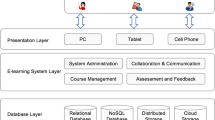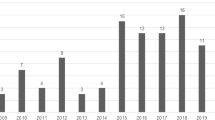Abstract
In this paper, we propose an advanced location awareness-based intelligent multi-agent technology that allows multiple users to share various user-centric mobile multimedia contents. This paper mainly focuses on (1) mobile station-based mixed-web map module via mobile mash-up technology, (2) a new location-based mobile multimedia technology using ubiquitous sensor Net.-based five senses content, and (3) location awareness-based intelligent multi-agent technology that includes a location-based integrated retrieval agent, a mobile social network (MSN)-based multi-user detection agent and user-centric automatic mobile multimedia recommender agent. This paper aims at validating and inspecting the usability, suitability, and applicability of the suggested technology via various performance evaluation experiments.




















Similar content being viewed by others
References
Jonghong, J., Seungyun, L.: Technical Trends of Mobile Web 2.0: What Next? In: Proc. WWW 2008 (2008)
Young, B., Choi et al.: Applications of “human factors” in wireless telecommunications service delivery. Int. J. Serv. Stand., 1(3) (2005)
Roxana, M.: Learning in high-tech and multimedia environments. Curr. Dir. Psychol. Sci. 15(2). WILEY Interscience (2005)
Milind, N et al.: Large-scale concept ontology for multimedia. IEEE Multimed. 13(3) (2006)
Avrithis, Yannis., et al.: Introduction to the special issue on “Semantic Multimedia”, Web Semantics: Science. Serv Agents World Wide Web 6(2), 137–138 (2008) (Elsevier)
Nakayama, Hiroshi. et al.: Development of the delivery environmental improvement system applying multimedia and the senses of a human being, Tokyo Denki Daigaku Fu-ronthia Kyodo Kenkyu Senta 2004 Nendo Kenkyu Seika Hokokusho (2005)
Sung-Yeol, K. et al.: Realistic broadcasting using multi-modal immersive media, Procedings of PCM 2005. Lect. Notes. Comput. Sci. 3768, pp. 164–175. Springer-Verlag (2005)
Steiniger, Stefan., Neun, Moritz., Edwardes, Alistair.: Foundations of location based services. University of Zurich, Zurich (2006)
GSM Association, Permanent Reference Document SE. 23: Location based services (2002)
Shu, W. et al.: Location based services for mobiles: technologies and standards, Proceedings of IEEE International Conference on Communication, IEEE (2008)
van Ossenbruggen, J. R. et al.: Cuypers: a semi-automatic hypermedia presentation system, Technical Report INS-R0025, CWI, Netherlands (2000)
Lemlouma, T., Laya¨ıda, N.: Adapted content delivery for different contexts, Conference on SAINT 2003 (2003)
Lemlouma, T., Laya¨ıda, N.: Context-aware adaptation for mobile devices, IEEE international conference on mobile data management (2004)
Metso, M. et al.: Mobile multimedia services content adaptation. Third international conference on information, communication and signal processing (2001)
Ansgar, S. et al.: Generic support for personalized mobile multimedia tourist applications, International multimedia conference proceedings of the 12th annual ACM international conference on multimedia table of contents (2004) pp 178–179
Oxford english dictionary. Oxford University Press (2007)
Encyclopædia britannica. Encyclopædia Britannica Inc (2007)
Flew, T.: New media: an introduction. Oxford University Press, Melbourne (2008)
Jenkins, H.: Fans, bloggers and gamers: exploring participatory culture. New York University Press, New York (2006)
Vrandecic, D., Pinto, S., Tempich, C., Sure, Y.: “The DILIGENT knowledge process”. J. Knowl. Manage. 9, 85–96 (2005)
Rittel, H., Kunz, W.: Issue as elements of information systems, Institute of Urban and Regional Development, University of California, Berkeley, California, Working Paper 131, (1970)
Rahwan, I., Zablith, F., Reed, C.: “Laying the foundations for a World Wide Argument Web”. Artif. Intell. 171, 897–921 (2007)
Chesnevar, C.I., McGinnis, J., Modgil, S., Rahwan, I., Reed, C., Simari, G., South, M., Vreeswijk, G., Willmott, S.: “Towards an argument interchange format”. Knowl. Eng. Rev. 21, 293–316 (2007)
Walton, D.N.: Argumentation schemes for presumptive reasoning. Erlbaum, Mahwah (1996)
Iandoli, L., Klein, M., Zollo, G.: Can we exploit collective intelligence for collaborative deliberation? the case of the climate change collaboratorium, MIT Sloan School of Management, Working Paper 4675-08 (2008)
Torch Mobile Inc., Iris mobile web browser. http://www.torchmobile.com/
Byeong-Geun, C., Yong-Wan, R., Dong-Ju, K., and Kwang-Seok, H.: An implementation of floral scent recognition system using ica combined with correlation coefficients. LNCS 5441. Springer-Verlag, pp. 654–661 (2009)
Thomas, P., The lucene search engine: adding search to your applications. http://www.javaranch.com/journal/2004/04/Lucene.html
Stanford Center for Biomedical Informatics Research, the Stanford University School of Medicine, Protégé. http://www.torchmobile.com/
Pettie, Seth., Ramachandran, Vijaya.: An optimal minimum spanning tree algorithm. JACM 49(1), 16–34 (2002)
Acknowledgments
This research was supported by MKE, Korea under ITRC NIPA-2010-(C1090-1021-0008), and the Korea Science and Engineering Foundation (KOSEF) grant funded by the Korean government (MEST) (No. 2010-0000-163).
Author information
Authors and Affiliations
Corresponding author
Rights and permissions
About this article
Cite this article
Kim, JH., Kwon, HJ. & Hong, KS. Location awareness-based intelligent multi-agent technology. Multimedia Systems 16, 275–292 (2010). https://doi.org/10.1007/s00530-010-0194-9
Published:
Issue Date:
DOI: https://doi.org/10.1007/s00530-010-0194-9




